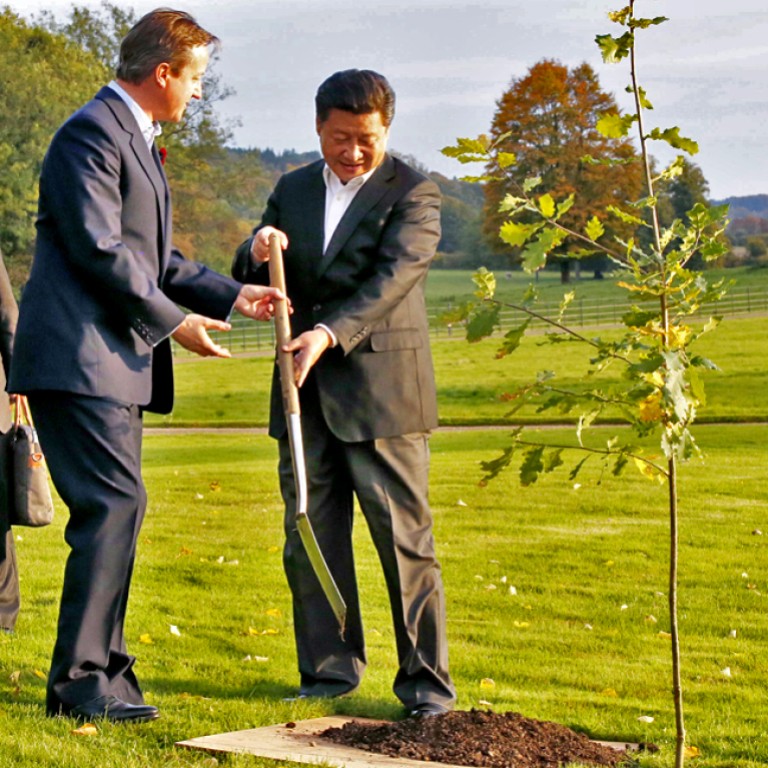
Analysis | ANALYSIS: Britain’s new ‘special relationship’ with China is built on pragmatism
Since the second world war, British foreign policy has been built on its so-called special relationship with the United States, which emerged from that conflict as the world’s most powerful nation. This week, London showed it was attempting to build another special relationship, with China, the world’s fast-rising power that is on its way to challenge US dominance in global affairs.

But this new turn of events raises two questions. First, just how special will London and Beijing will regard their relations in the years to come. Second, how similar – or different – will Sino-UK relations be to the longstanding transatlantic alliance.
Britain is known for its pragmatic diplomacy. For instance, it was not only the first Western nation to recognise the new communist republic in 1949, but did so even before the Soviet Union for fear of a possible communist military takeover of Hong Kong. British foreign policy is best summed up by the words of 19th-century prime minister Lord Palmerston: “We have no permanent allies, we have no permanent enemies, we have only permanent interests.”
READ MORE: The eight key messages Xi Jinping seeks to convey to the world on his UK visit
China’s state media played up the pomp and pageantry of the welcome for Xi’s four-day visit, especially the involvement of Britain’s Royal Family, to showcase such “special relations”. The warmth of relations has also drawn widespread criticism of London’s foreign policy.
But most analysts said future Sino-UK relations will focus on pragmatic interests rather than the common values, security concerns and strategic goals that the British have long shared with their American counterparts.
“Both countries have enjoyed a special period of close bilateral relations and these especially close ties are largely based on the economic imperatives of both nations,” said Hongyi Lai, a professor of Contemporary Chinese Studies and Politics at University of Nottingham.
“The two countries are laying the foundations for a strategic partnership based primarily on common commercial and economic interests,” said Kamel Mellahi, Professor of Strategic Management with Business School at University of Warwick.
Xi brought with him trade and investment deals worth some £40 billion giving rise to British hopes that China will be its second largest trading partner within a decade. Analysts noted however that both nations were still ideologically divided over the issues of human rights, Hong Kong, Taiwan and Tibet.
“For the UK, they are driven by economic considerations while for China, it is perhaps a mixture of both economic and political considerations,” said Jingdong Yuan, an associate professor of international relations at the University of Sydney’s Centre for International Security Studies.
READ MORE: Hong Kong's tycoon Li Ka-shing's 20 year record on UK investment beats China's
“While economics dictate their relations, global strategic and geopolitical considerations have also played a role in the forging ahead with such good relations,” said Zhu Jiejin, a professor with the School of International Relations and Public Affairs in Fudan University.
In a speech to UK parliament, Xi cited a number of “first achievements” as evidence of such “special relations”.

Addressing peers and members of parliament in the Royal Gallery at Westminster, Xi named the UK as the largest overseas offshore RMB trading centre after Hong Kong. Britain had become the first western country to issue RMB sovereign bonds. London became the first Western nation to join the China-initiated Asian Infrastructure Investment Bank despite strong opposition from the US. Britain also hosted more Chinese students and Confucius Institutes than any European Union country.
“If one uses all these firsts, yes, this looks quite different from China’s relationships with other powers, especially given that UK is a major Western country, one that has a special relationship with the US,” Yuan said.
“The UK is an important Western power; forming a good relationship with it, from China’s perspective, foils US efforts to isolate or contain China and is an indication that the Western block is not monolithic.”
Lai said China also wanted the special relations to advance its global influence. China also wanted to find good investment opportunities for its huge foreign reserves and for its infrastructure-related industries.
“Overall, beneath the increasingly close bilateral ties are the economic and political pragmatism of the leadership in both countries, especially in the period of global economic slowdown and in the age of emerging new economies,” Lai said.
READ MORE: ‘Let Hong Kong elect its own leader’: Britain’s David Cameron asks Xi Jinping to ensure city’s political freedom
Some analysts said the UK should have calculated carefully that its new “special relationship” with China should not jeopardise its old ties with the United States or alienate other Western allies. Britain’s high-profile and lavish treatment of Xi during his visit has already triggered widespread criticism in the West, particular among American commentators.
Yuan said Washington was not pleased and while many American analysts argued the UK’s pursuit of commercial interests could harm its fundamental interests in the long term.
“The UK’s actions are seen as undermining US interests in pushing China on human rights, respect for the rule of law, South China Sea, and so on. I guess the US is disappointed given they think they have this special relationship,” Yuan said.
Steve Tsang, chairman of contemporary Chinese studies at the University of Nottingham, said the UK’s present China policy was largely the work of Chancellor George Osborne, who “has caught the China bug but did not really understand the subject matter”.
“The Foreign and Commonwealth Office, which knows China and related policy matters, has been sidelined,” Tsang said.

